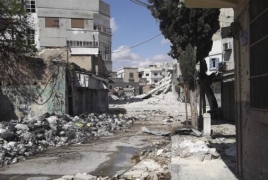
The UN says it plans to deliver aid to about 150,000 Syrians in besieged areas over the next five days amid a partial truce in the country's civil war. It said it was ready to help an estimated 1.7 million people in hard-to-reach areas by the end of March, BBC News reports.
A cessation of hostilities began on Saturday, Feb 27, and there have been complaints of breaches from both sides. But it otherwise appears to be intact with a key Syrian opposition group saying the situation was much better.
The UN's humanitarian coordinator in Syria, Yacoub el-Hillo, called the truce "the best opportunity that the Syrian people have had over the last five years for lasting peace and stability".
The organization plans to use the lull to deliver food, water and medicine to towns like Madaya, where residents have reportedly been starving to death. It said it needs approval of Syria's warring parties before it could further expand its deliveries.
Efforts to deliver aid to Islamic State-besieged Deir al-Zor by air last week failed when several pallets were damaged, disappeared or landed in no-man's land.
The UN estimates almost 500,000 people are living under siege in Syria.
The cessation of hostilities was agreed as part of a U.S.-Russian plan, who have backed opposing sides in Syria's civil war. It does not apply to the fight against so-called Islamic State (IS) or the al-Qaeda-linked Nusra Front.
The main Syrian opposition grouping has complained of several violations of the ceasefire by the government side, which is supported by Russia.
According to the BBC, the High Negotiations Committee (HNC) said it would be sending a formal letter of complaint about the breaches to the UN and other world powers. However, the HNC said that despite violations "here and there", it was "positive to see people getting relief… to be safe, and free from fear".
Russia also complained of several breaches but said "on the whole, the ceasefire regime in Syria is being implemented".

